 By Madison O'Leary The last nine months have been stressful for the seniors in the middle of the college application process. I, myself, am one of them. Most of us were unable to go on college tours, give in-person admissions interviews, or submit our standardized test scores. However, many colleges have adapted very well to the current situation, despite how inconvenient it may be. So, here is a list of things that may help seniors make their college admissions decisions:
I also conducted an interview with Anushka Rajmohan, a fellow senior, to get her perspective on the application process for this year: Q: What has your experience been applying to colleges during COVID? How did you research the schools you’re applying to? A: I think the college experience is generally stressful for kids, especially having heard that from my older brother, but it was definitely much more stressful and confusing with our new situation. I had researched a lot online about my colleges, and had talked to people who have gone to the schools/going to the schools, but it felt like a whole new ball game since the application process and admissions statistics will be very different this year. Q: Did you take virtual tours of the different schools? Did doing so help you make any decisions? A: I took virtual tours for my top schools, and I don’t think it was enough to replace a real tour, but I was definitely impressed by the adaptability of the colleges and how fast they were able to adapt to the virtual scene. The tours helped too because I could talk to and just observe some of the students already going to the colleges. It also helped to get a feel of what kind of college it is, not just academically but socially, as well. The college process is definitely more stressful than it usually is, but researching and getting organized helps relieve a lot of that anxiety. In the next few months, the admissions decisions will be out, and we will all be done. Just try to take a deep breath and remember that everything will work out the way it is supposed to happen. Good luck!
0 Comments
 By Marissa Cohen This year’s upcoming election might be one of the most important ones in our nation’s history. Between debate cancellations, attack ads, and a global pandemic, the road to November 3rd hasn’t exactly been easy. However, while many of you probably hear the words “Trump” or “Biden” every 10 seconds, they’re certainly not the only two people running in this election. Many people these days are tempted to just vote down the party line, but local elections can be just as important, if not even more important, than the presidential one. In Newtown Township and Newtown Borough, there are two other very important elections: one for our U.S. House Representative, and one for our state representative. There are also a few smaller, more local elections this year such as local judges. Some of you know a bit about the election for the House of Representatives. The two major names in this race are the incumbent congressman Brian Fitzpatrick (R) and Christina Finello (D). Our district’s congress race is usually one of the most debated in the months leading up to the election, as the results tend to flip-flop between political parties. This race is one that’s gained much national attention, with Finello being noticed by notable congress people such as Elizabeth Warren and both candidates being featured on major media stations and shows. Fitzpatrick and his family are very well known and respected in this area, so the polls currently favor him. However, Finello is not too far behind. The other important local race this year is for state representative, a race between incumbent representative Perry Warren (D) and newcomer Charlie Adcock (R). Both men live in Newtown, with children who have gone or who currently go to Council Rock. Warren has served as our district’s representative since 2016; he has a very bipartisan and common sense approach to his politics. Funnily enough, one of Charlie Adcock’s major election points is common sense too, and it seems to be what he’s pushed a lot in his campaign. Like the election for Congress, it is currently projected that the incumbent representative will win, but you can never be too sure when it comes to polls. If the 2016 election showed anything, it’s that polls aren’t always accurate. These local elections are very important: these are the people who will be making decisions that affect Newtown directly, and the people who will represent you in the state house and in Congress. So, what can you do to make sure you have a say in the local elections? Vote! There are multiple ways to vote this year: you can go to the polls on November 3rd like usual, or you can request a mail-in ballot, another perfectly safe way to cast your vote if you’re nervous about in-person voting during the pandemic. Doing your own research on these candidates is very important too. If you don’t take everything at face value and you make your own decisions based on policies and facts, you’ll be more comfortable with who you’re voting for and you’ll be picking the candidates who best represent you. So, if you’re casting your vote in this year’s election, remember that while it may be all you hear about, it’s not just Trump and Biden.  By Lindsay Gottlieb Who doesn’t love to stay up late on a summer night watching Netflix, texting friends, and doing anything else to avoid sleeping? This is because most students see summer as a three-month-long opportunity to relax and not stress over school. However, as back-to-school season approaches each year, students realize they have to begin regulating their sleeping schedules. Staying awake until three in the morning on school nights will lead to extreme fatigue during the school day, and a result of that, inefficient performance. A 2015 study from the CDC reported that approximately 72% of American high school students do not get enough sleep on school nights. Parents suggest that the use of technology in bed is a main cause of this problem. To fix this problem, many parents have limited screen time for their children, to make sure they get an adequate amount of sleep. Mental health disorders such as depression, anxiety, and bipolar disorder have been linked to sleep deprivation. Perhaps today’s teenagers do not understand how vital sleep is to the body and when this function begins to decline, things such as behavioral changes are the consequence. On the search to collect accurate information relative to not only American high school students, but specifically Council Rock North students, I decided to interview one student from each grade level about their feelings on this matter. I asked them the following three questions:
“Since the transition from school to summer, I’ve gotten a lot less sleep. I find myself struggling to stay awake in first period. I don’t even go to bed at an unreasonable time for a student my age. For a student to get a full 8 hours of sleep while waking up at 6:30, they would have to go to bed at 1[0]:30 at the latest. This is completely unreasonable for students ages 14-18. Most kids in this school are not sleeping before 11:30. I think that school should definitely start later. Not only would students be able to pay attention better in first period, but they also would be able to sleep in and get their full 8-10 hours of sleep.” -Ella Ciervo, Grade 9 “No, I have not experienced a decline in nightly sleep since the transition from summer to school. Yes, being well rested is important to me, so I manage my time so that I can get 8-10 hours of sleep each night. Of course, there are exceptions to this. For instance, if I have an event or a lot of homework. I think that it is possible for students to manage their time wisely like I have. I play three sports, am an honor roll student, and the president of a club. I still have time for other activities while balancing all of these things. At the high school level, everyone should be able to do this. Why should we change school start times at this problem can be fixed by our student body? If we started later, we would also get out later, creating later nights. Often times, high schoolers will stay up even though they have school the next morning. That's their own fault, they aren't responsible enough to prioritize sleep and go to bed earlier. If we bend the start times, it will only hurt our children, because they won't learn how to manage time or get up and take action. When they have a real job, do you think they will move their start time because little Jimmy from CR isn't getting his sleep? No, that is pathetic. I am a firm believer that CRSD should maintain the early start time so that we can produce productive, working class citizens.” -Addison Adcock, Grade 10. “Yes, definitely I am sleeping less. … I get about 5-6 hours of sleep each night. I believe that school should start at 8,even though it may push sports or activities back an hour or so. It will allow students to get more sleep and be more awake at school.” -Ava Angelakis, Grade 11. “I got much better, fuller nights of sleep over the summer. … I have to wake up at 6am to get to school on time, so it’s very difficult to get 8-10 hours of sleep. Yes, I think [a later start time would] be great! There may be some conflict with elementary and middle school buses which is a con, but older students need more sleep. Students would be more alert and healthy, which is the most significant result of a later start time, even if it would take some work with other levels of school.” -Alexa Schnur, Grade 12. After collecting these responses from my fellow students, I have concluded that 75% of my interviewees are in favor of a later start time to get more sleep. They believe this could potentially increase productivity in school, rather than falling asleep in first period. I have also drawn the conclusion that most students feel relaxed with a more flexible sleep schedule during the summer. Should Council Rock push back school start times in hopes of increased efficiency by both students and teachers? This has been a debatable topic for a long time, and will probably remain as so until a final decision is made by the School Board.  By Karen Leifer Times are difficult. According to The New York Times, as of April 15th, 2020, over two million people have been diagnosed with Covid-19 worldwide. Over 130,000 have died. Covid-19, a result of a coronavirus, has increased stress in the population. On the topic of stress, I started wondering what types of stress students face both in school and during virtual learning. To answer some of my questions, I conducted phone interviews with freshman students Sophie Snyder and Lindsay Gottlieb. Q: What are your main causes of stress? Ms. Gottlieb responded that her main cause of stress is “not understanding a concept” taught in school. Ms. Snyder’s main cause of stress is the “expectation to do well and constantly working [sic] hard.” She also feels stressed by the constant “drilling of assignments.” Both students' main stressors revolve around school-related topics. According to a 2018 poll from GlobeNewswire, forty-five percent of students reported being stressed “all the time.” Thirty-seven percent of students were “sometimes” stressed. Q: How would you evaluate your school-related stress rate on a scale of one (lowest possible answer) to ten (highest possible answer)? Ms. Gottlieb’s stress level is a six while in a traditional classroom setting, but an eight during the period of online learning. Ms. Snyder’s stress level is a six. She feels that “high school is more organized” than middle school, and she has developed time management skills. Both students rated their stress over the halfway mark of the scale. Q: To what extent are teachers aware of students’ school related stress? Ms. Gottlieb said that she believes most teachers are aware that students face stress, “but some choose to ignore it.” She also stated that some teachers are aware of the impact stress has on students’ mental health. Ms. Snyder stated that she believes teachers are aware of stress in students, but “some teachers understand better than others.” Conclusions can be drawn from both ladies' responses that some teachers are aware of students' stress, but not all are fully informed or seem concerned about its impacts. Q: Is traditional classroom learning more or less stressful than online learning and why? Ms. Gottlieb responded that online learning has been more stressful as most assignments consist of comprehending a text and responding to questions afterwards. She “would prefer to be in a classroom where a teacher’s help is available.” Ms. Snyder’s response was the opposite of Ms. Gottlieb’s. She stated that there “isn’t as much pressure” due to the pass/ fail grading system being implemented during the fourth marking period. As both responses were different, they show that learning is not a universal experience, and students’ stress stems from different sources. Q: What would a student need in order to feel less stressed? Ms. Gottlieb responded that “school stress can never be alleviated. It will always exist to some extent.” She believes that teachers need to take other classes and subjects into consideration when assigning work. Her response also included that “homework is necessary at certain times but is arguably one of the most significant causes of student stress.” Ms. Gottlieb believes that homework should consist of unfinished classwork and a little bit of practice from the lesson taught in class. She disagrees with the assignment of work that teaches a new concept, separate from the one reviewed in class. Ms. Snyder reported that “more understanding from the school [and] teachers” is necessary. She doesn’t feel as if they recognize that students have stress outside of school too. She also feels that students are often asked about, “what we want to do for the rest of our lives, while we’re still children.” After I conducted the interviews with Ms. Gottlieb and Ms. Snyder, I concluded that school is a major source of stress for students. Teachers are not always aware of their students’ stress levels and are not always taking measures to try and fix the stress students feel. For students to have a calmer learning experience, teachers may need to reevaluate their methods of teaching. 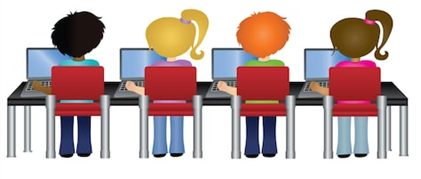 By Kara Grossman It is safe to say that even with 20/20 vision going into the new year, no one saw a statewide school closure and virtual learning coming. Among all the other crazy changes everyone must make to their everyday life as a result of the COVID-19 pandemic, the most out-of-the-ordinary perhaps is virtual school. Unless you have been homeschooled for some point in your life or have taken an online class, this is an entirely new ball game. You wake up on March 12 and it’s 6:05 A.M. You probably think about different tests you have that day while getting dressed or eating breakfast. Maybe you’re struggling to work on last minute homework, or you’re making coffee to try and keep yourself awake. Then, you take the bus or drive and eventually arrive at Council Rock High School North. Numerous students constantly file in through the doors with you and make their way to the first period. Then second, followed by third, fourth, fifth, sixth, seventh, eighth, and lastly ninth. They talk to friends and teachers. They engage in lessons and absorb the material. They may be distracted from lack of sleep, but classmates still laugh and talk throughout the day. And those kids don’t realize the privilege that comes with their everyday routine. Now, merely a month later, the world for Council Rock students has inverted. They probably wake up several hours later than before and start their work at their leisure. The most-visited apps on their phone are now Canvas and FaceTime. If they are anything like me, they miss their friends and teachers. They miss all the extracurriculars and events that are cancelled. Perhaps even the imposed structure of their day. They feel as though their life has been ripped from under them, and now they must adjust to this new sense of normal. It’s novel, and it’s daunting. But throughout all these adjustments, one must maintain motivation and provide individual structure. It can be hard to accomplish schoolwork without much guidance. For some, they thrive most when they have explicit directions and in-person, synchronous learning. If students feel lost, they should remember that changes take time, and shifting to completely digital learning is not accomplished overnight. To get yourself off the ground, maybe start waking up at a uniform time every day. Check Canvas daily or map out one week at a time, and double-check works submitted to not miss assignments. Many additional resources are available, such as teacher’s announcements, virtual clinics, and websites. Your teachers want you to thrive within this virtual atmosphere and have evidently worked hard to quickly adjust lesson plans. If you can maintain motivation and utilize your resources, accomplishing work becomes easier and more familiar each time. When reflecting on this past month and the rest of the school year ahead, notice how lucky Council Rock students are to have devoted teachers and a resilient school district that made the virtual shift possible. Although stressful at first, one should look at online school as another necessary change in this unprecedented time for not only Pennsylvania, but also the whole country. Staying home is aiding the cause and, maybe with the return of school, we won’t take 7:30 A.M classes for granted again.  By Will Sohn Wow. Last week, all Pennsylvania public schools closed for the remainder of the 2019-2020 school year. The abrupt ending for North seniors (including myself) was extremely disappointing for many of us. Spring sports and senior-specific events like prom, the senior trip to Disney World, and even the graduation ceremony itself have either been cancelled already or are under review. These once-in-a-lifetime events have existed for generations and make high school senior year very memorable. As we are unable to have traditional events and activities, this year seems like a bad dream for many of us. However, the district leaders are working to launch their CR Celebrates the Class of 2020 plan. This alternative seeks to honor the seniors through virtual means including social media campaigns and distribution of commencement items and yearbook delivery. Administration is still trying to find ways to encourage seniors during these times. Many teachers sympathize with our situation, but they know that we still have plenty to look forward to as we graduate and jump into the world. Mr. Sherpinky, North BCIT teacher, spoke about our situation. “You face a world very different from your parents’ and grandparents’. To be successful in the future, you must be able to think creatively, plan systematically, analyze critically, work collaboratively, communicate clearly, and most importantly learn continuously. While your parents and grandparents used many of the qualities to build our current world, you will require all of these qualities to build the future. Council Rock has given you the foundation for success. These qualities were built into every class you took at CR. It is your mission to find the right combination of these qualities to find your own personal success, happiness, and future. I know all of your teachers at Council Rock wish you and the Class of 2020 the very best.” Many other teachers sympathize with our disappointment and agree that we are prepared to graduate high school. Mrs. Hill encourages seniors to carry out the valuable lessons we learned here. “Don't be afraid to make decisions and to try new things. The decisions you make are important, but don't be paralyzed by fear of making the wrong choice. Value people and relationships.” Even without a normal ending to our high school career, we still have plenty of memories to reminisce upon. Whether it was the blue & white nights, the football games and stadium, the classes and teachers, or the building itself, Council Rock High School North will always be an amazing experience. Even though the Class of 2020 will have different senior year memories from other North alumni, we all share memories about our beloved school and people we met here. This ending was a reminder to cherish what we have in the moment and prepare us for our futures. The Class of 2020 is set apart...perhaps it’s not as bad as we may think. 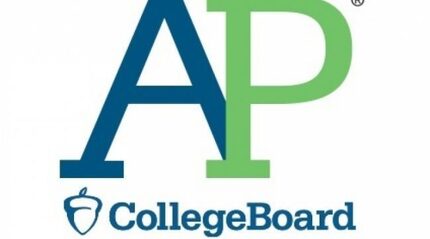 By Anushka Rajmohan With course selections already well underway, in the next couple of weeks, students will be deciding what classes best suit their own individual interests and strengths. Considering the variety of courses Council Rock North offers for its students, this process may be difficult, especially when students are faced with the decision of pursuing Advanced Placement, or AP, classes. The Advancement Placement program is sponsored by the College Board organization throughout the United States and Canada. As the name suggests, AP classes are more advanced than the honors classes offered at school. These AP courses offer students the rigor of a college-level course for students who want a more challenging course than an honors level course. In addition, AP classes offer the opportunity to earn college credits to transfer to college. These credits can be obtained by taking a test offered by the College Board annually in May. As would be expected, the workload in an AP level course is far more than that of other courses offered in high school. Kajal Sitapara, a student at Council Rock North who takes AP World History, comments that the “[AP Class] is much more project-based. There’s not homework every day, but there is a lot. It is manageable if you don’t procrastinate too much.” Sitapara stresses the need to be much more independent in AP courses than in other courses. Also, she believes the heavy workload is doable if one has good time management skills. Miss Mallon, the AP World History teacher at Council Rock North, also adds to this, mentioning that “AP classes differ mostly in pacing and expectations of independence of the student.” She further emphasizes the importance of being “independent learners” and “good time managers.” This advice stems from the fact that with the rigor that comes with AP classes, teachers are not able to teach in the classroom everything the AP student would need to know. Rather, AP students must study some content on their own in order to be the most successful in their AP courses. Therefore, students will have more work since they must learn new content and process it while processing what they have already learned in class. Why even pursue these challenging classes? Many students taking the AP classes, or thinking about taking these difficult courses, have mostly one thing in mind: colleges. Colleges, selective colleges especially, are more inclined to choose students who showcase their academic strengths by having a schedule with laborious classes. As an article about higher-level classes from the Chicago Tribune states, “having either AP or IB classes on a high school transcript can set some applicants apart from others…[it] allow[s] a student to have a more heavily weighted GPA, which can help with class rank as well as college admissions.” Students’ chances of being admitted into a more selective school increase when they can convey their skills through their success in harder level classes, such as AP classes. Other students are more drawn to another benefit of AP classes: these classes offer students the chance to earn college credits when they perform well on the AP exam. These college credits can then be transferred to the college the student will be attending, depending on the college. Some colleges recognize these credits by directly transferring the credits earned, based on the score that they received on the AP exam, and substitute these credits for a required class. For example, scoring well on the AP Biology exam may allow a student to skip the Introductory Biology course in college. Earning these college credits in high school ultimately saves money in college since students would not need to actually take a class and pay for this class in college. Also, with these already earned credits, students are able to graduate early in college because they have already earned a portion of the required credits for their degree. On the other hand, other colleges place students into an intermediary or advanced level of a course based on their AP scores. For example, instead of being placed into an Introductory Biology course, a college would place a student into the intermediary Biology or advanced Biology course from the start. This way, students can skip these introductory classes, but not earn college credits that count toward their graduation requirements. These potential benefits convince most students to pursue AP classes, but Miss Mallon also adds the skills that can be gained by taking any rigorous course in high school: “I believe taking any rigorous class that holds high academic standards and encourages independent thought prepares you to be a successful college student. AP classes generally do that since the exam gives us a common goal and a strict deadline.” She believes that the skills learned from taking any rigorous course, such as an AP course, will be beneficial in college. These courses help to develop very valuable skills in students, which she believes will be beneficial in college and life. Although AP courses have a lot to offer, they might not be the right path for everyone. With the immense workload of an AP class and the independence required to be successful in the course, it is difficult, to say the least, for many students to maintain these challenging classes in their schedule. This might even prey on a student’s mental health if a particular AP course is not suited for the student or their busy schedule. Miss Mallon agrees with this: “If taking AP classes erodes one’s well-being, then I don’t think they should. If a student is up for a challenge and can maintain a balanced schedule, then taking an AP class can be a very enriching and rewarding experience.” When a class starts to become detrimental to a student’s health, this starts to outweigh the valuable skills that can be learned from the class. Therefore, deciding if an AP class is the right fit for a person should be a well-thought decision with consideration of the student’s schedule, and strengths and weaknesses. Especially in this competitive world we live in today, there is immense pressure from colleges, parents, teachers, and sometimes even other students for students to push themselves and pursue the hardest courses. These difficult courses, such as the AP course, can be rewarding later in life. However, it is important to reach an informed decision that is appropriate for the student and his or her schedule, or the course will become more detrimental than helpful for the student.  By Gowtham Pichaiyan and Ayush Shah For many, driving is a rite of passage. A stage in life that marks freedom, responsibility, and power. With this new privilege, it is only natural to search for the opportunities to buy a car to call your own. However, the process of buying a car is notorious for its many steps, precautions, and dangers. This article will outline the basics of buying a car without breaking your bank. One of the first steps in buying your automobile is picking a model based on your preference. Similar to most things in life, the more premium choices tend to cost more. When deciding the capacity of the options above, it is important to realize that these factors influence how much you will pay upfront and in the long run. The criteria you choose for a car influence the following prices: cost (how much you pay upfront), maintenance (how much it costs to make repairs and keep the car running), and insurance (how much the insurance company sees fit to charge you based on the rating of the car). For example, buying a brand new Lexus coup will ensure high performance, safety, reliability, and clean appearance, but the upfront cost, maintenance, and insurance are bound to be exorbitant. To prevent falling into a pit of endless debt, experts advise that car buyers should prioritize the criteria and choose an appropriate car within their budget. Now you should know that cars are very bad investments, as the price depreciates the second the car is taken out of the lot. However, at the same time, this shouldn’t sink your boat in terms of car buying just yet if you properly plan out how you will go about buying. First off, there are two main ways to get a car: buy or lease. Buying a car makes it your property while leasing is essentially borrowing the car for a fixed period of time. While leasing is the cheaper option, it comes with its drawbacks, as there is also a limit on the number of miles you can drive and also you cannot sell the car when the lease is up. Once you decide on that, you must establish a budget based on your needs and ability to pay which will help to choose the model and brand preferences. When you have chosen all of these, it is time to move on to the financing part of the process. Before you go to get a car, you should research prices online of the car you are viewing to make sure you find the best invoice price. Once you are fully prepared, it is time to buy the car. It is important to be able to know how to negotiate with the dealer as it is possible to get significant discounts with proper negotiating. Once the price is settled, it is time to pay for the car. Most people will need to take a car loan out to pay for the car. On the chance that you have the ability to pay the full price on the spot, that is the best option as interest will not be an issue at all in the future. With a car loan, interest will be a key aspect of the loan repayment, usually spanning for a couple of years. The national average for US auto loan interest rates is 5.27% on 60-month loans. Taking out loans is a costly investment that could easily hinder your ability to purchase any other expensive items during the loan period, so it shouldn’t be taken out without extreme thought. Along with the cost of the car itself, there comes a necessary maintenance cost for the future of the car. Luxury cars will typically end up costing more in maintenance than standard types of cars. There is a fuel cost as well to be mindful of, as gas mileage could end up turning a cheap car into a gas-guzzler in the future, costing you thousands of dollars. Finally, insurance is a vital part of owning a car, as all cars must be insured to be allowed on the road. You must take the time to choose the correct plan to fit the basic legal requirements as well as any other precautions you would want to take with the expensive item you just purchased. It truly shows how complicated car buying can be and how important it is to do prior research and make a plan before you even walk into the dealership. Cars are a symbol of desired freedom for teenagers, but at the same time, they can be the chains keeping you bound to a dealership monetarily. 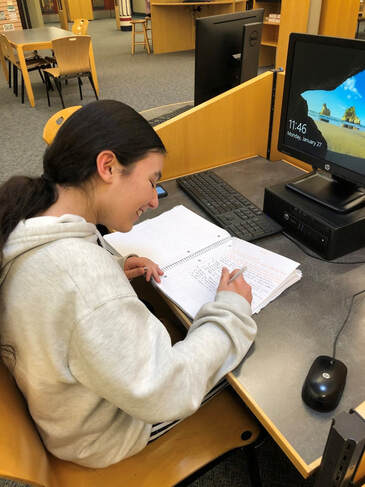 By Karen Leifer Think about the worst part of your day. Is it waking up at the crack of dawn to get ready for school, heading into your least favorite class, or even doing the dishes? For me, and many other students, it’s homework. All high schoolers can relate to the struggle of studying for tests, writing essays, taking notes, and reading textbooks. In an effort to understand the misery, I decided to survey students and staff members about homework. According to a January 2020 Council Rock North survey, there are large discrepancies between teachers’ and students’ perspectives when it comes to homework. On average, the educators surveyed believed that students should be spending about twenty-five minutes per subject per weeknight on homework. When all subjects are taken into consideration, these teachers believe that students should be spending between 1.5 to 2 hours on homework a night. But student report spending almost double the amount of time that teachers suggest. The students surveyed are from a variety of different grades and courses. These students report spending an average of three hours on homework a night. During the weekends, students are spending a little over four hours on homework. With an extra four hours students could volunteer in the community, have social interactions, or waste time on their phones. Clearly, students’ reports largely vary from the teachers’ expectations of about one and a half hours of homework per weekend, or twenty minutes per subject. The biggest surprise is that half of the surveyed educators reported not assigning homework over weekends or breaks. It is quite strange that some teachers aren’t assigning homework over weekends, yet students report having more than during the week. Perhaps a wider spectrum of surveys may have indicated a closer gap between teacher expectations and student’s time spent on work. Teachers themselves have to complete work whether it may be lesson planning, differentiating instruction, or grading. The surveyed teachers reported an average of one and a half to two hours of “homework” a day outside of their teaching responsibilities. Thus, teachers believe they are spending the same amount of time as students on work outside of school, but the survey indicates that some students are working almost twice as long as teachers. The teachers surveyed mainly said their purpose in assigning homework was to have students practice concepts learned in class. Other purposes include learning new concepts and preparing for future classes. Although teachers’ purposes in assigning work seem to benefit students, many students do not view it this way. Students often have a hard time focusing when completing work. Seventy percent of students surveyed reported that their biggest distraction while completing work was their phone. Other students reported being distracted by “literally anything” or the desire to sleep. Assigning homework seems to be a routine part of school for teachers, but a hassle for high schoolers. In conclusion, homework may hurt many students. According to the American Psychological Association, homework can cause students to face “boredom and burnout toward academic material.” It also decreases time they could be spending with their family and friends. A study from Dr. Rubén Fernández-Alonso shows that “when kids reported having more than 90 to 100 minutes of homework per day, [test] scores declined.” In order to alleviate stress and negativity in students, teachers may want to consider changing how and when they assign homework. Students are spending almost double the assumed time completing work. They also are easily distracted by technology, which may be from fatigue. If homework assignments are decreased, students may become less stressed. Council Rock North will be a happier place when teachers assign less homework, allowing students to pursue other interests. 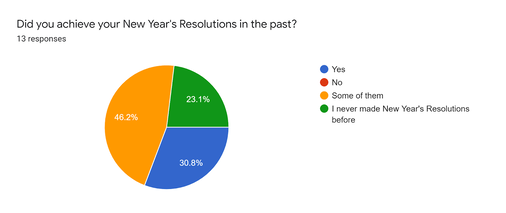 By Jessie Jin January is busy and stressful with midterms, the end of the marking period, and course selection. Yet at the same time, January is a redefining moment, a new beginning. This new year has so much potential and it is vital to start strong. Thus, goals, or in this case New Year’s resolutions, can help you roughly sketch out the new year. (Note that the tips discussed in this article can apply to all goals.) Making New Year’s resolutions is a yearly tradition that helps people reflect on the previous year and improve shortcomings. Often times, people (myself included) are motivated and confident the first few days after making the goal. However, by February many people lose motivation and forget about their goals. If New Year’s resolutions seem so short lived, why do we make them? Psychiatrist Dr. Glenn Miller cites tradition, self-improvement, and a desire to start. He believes that resolutions challenge us and open our mindsets. One study shows that 46 percent of people who wrote resolutions achieved their goals whereas only four percent of people achieved their goals without writing them down. To put things into perspective, I conducted a survey which thirteen ninth graders participated in. Among the ten students (77%) who previously made New Year’s Resolutions, three students (46%) achieved some of their goals. In the past, numerous students resolved to “eat healthier,” “exercise more,” and “get better grades.” As goals for 2020, four people cited time management or efficiency. Student Amber Li hoped “... [to create] an allotted time for each task before beginning anything” to be more time efficient. Freshman Jaden Wan indicated that, “I will study ahead of time for tests and make sure I understand the information taught” to achieve better grades. In regards to sleep, one student remarked that to get more sleep and rest, “I’ll try to get off my phone at a reasonable hour. I could create a routine before sleeping.” Since resolutions are unique to you, you may face different challenges to achieve them. However, we can analyze common trends to determine the greatest pitfalls and how to avoid them. In the survey mentioned above, stress and lack of motivation were the most common problems, as nine and eight people cited them, respectively. Fortunately, we can alleviate those problems. Psychologist Jelena Kecmanovic offers science-based tips to keep resolutions. First, you should figure out what you value and honor those values. If you enjoy doing something, you will work hard and not lose motivation. Next, you can change your environment to avoid temptations that will prevent you from achieving your goals. A classic example is to put away your phone if you want a good night’s sleep. In addition, you can adapt to change by using a gradual approach to reach your goals because drastic changes can be overwhelming. For example, if you wanted to save thirty dollars a week, you could start by saving a few dollars a week and then work your way up to save more money. But most importantly, remember to stay positive. You will encounter setbacks, but never be bogged down with failure. Remember Winston Churchill’s wisdom that “[s]uccess is not final, failure is not fatal: it is the courage to continue that counts.” Rather than fearing failure, we should learn from failure to lead us to success. Indeed, you may face obstacles, but never lose hope. If you do what you are passionate about and endure trials, your actions will become habits. Then you will achieve your goals as easily as breathing. |
Archives
February 2022
Categories |
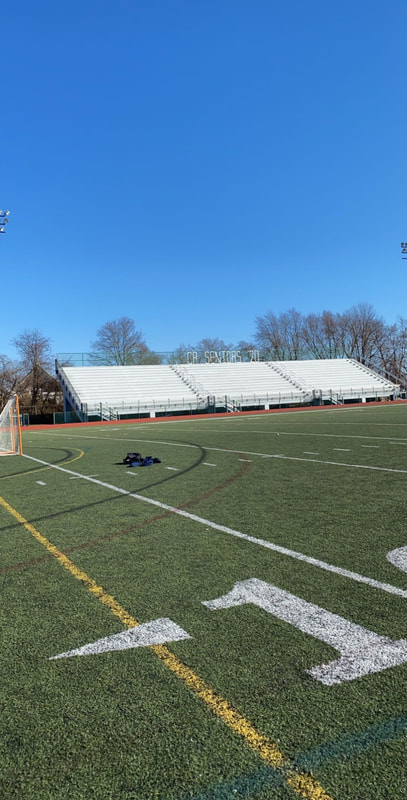
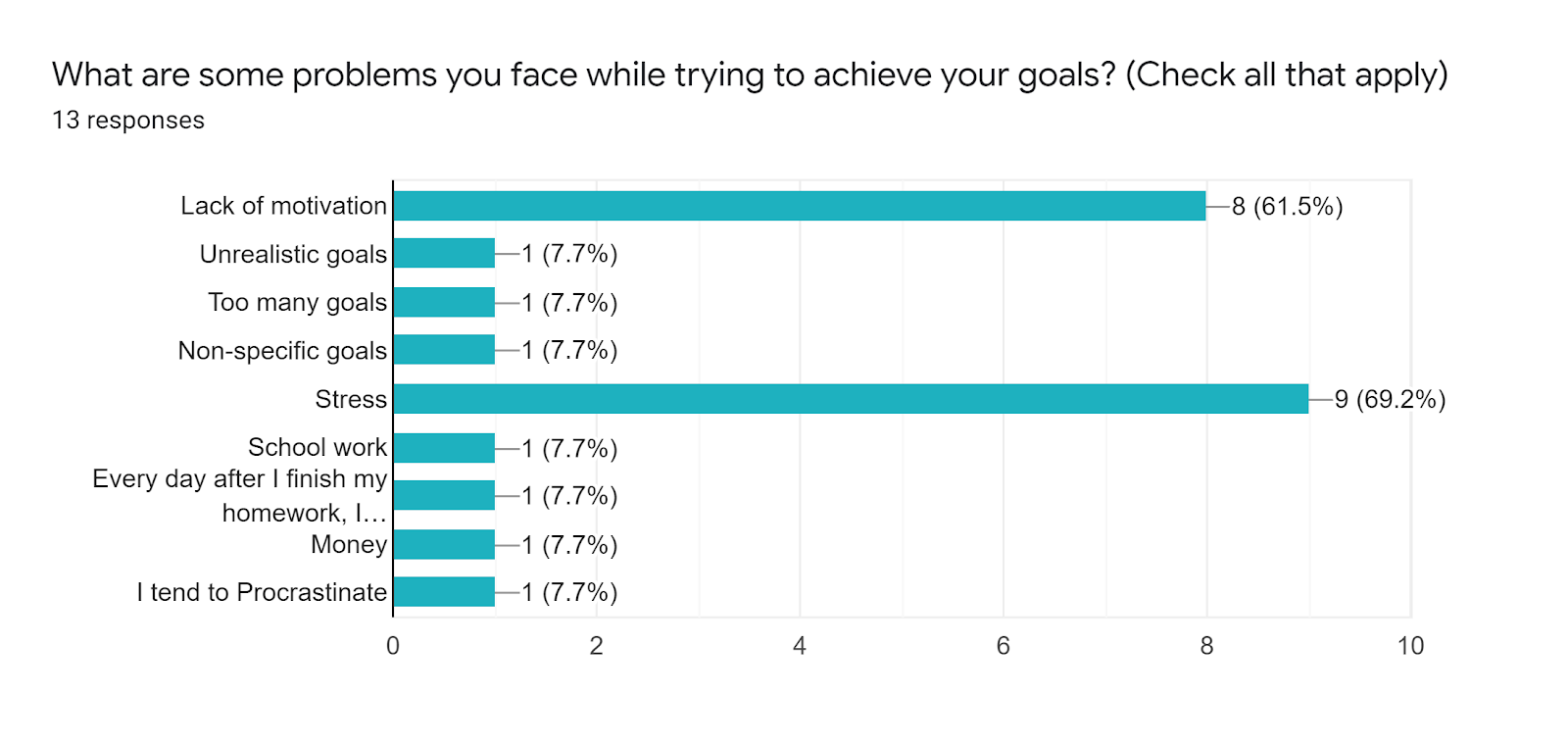
 RSS Feed
RSS Feed
